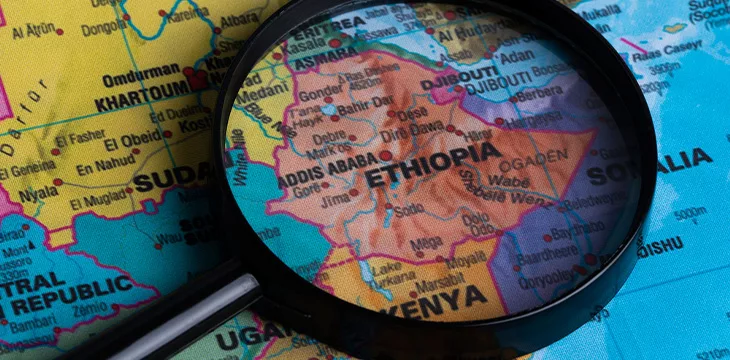|
Getting your Trinity Audio player ready...
|
Since being booted out by the Xi Jinping administration in 2021, Chinese block reward miners have been seeking a home, with temporary stops in Iran, Kazakhstan, Russia, and some European countries. Now, these miners are reportedly settling in Ethiopia, with its low electricity charges and ideal climate as the major attractions.
Data gathered by Luxor Technology shows that Ethiopia has been one of the world’s top destinations for mining rigs since September 2023. This is despite the Eastern African country’s checkered history with digital assets—while it recently permitted mining, trading remains outlawed.
Chinese miners have been the most prominent investors in the country, a report by Bloomberg reveals. The country’s grid operator has reportedly signed agreements with 21 miners, 19 of whom are Chinese.
“Ethiopia will become one of the most popular destinations for Chinese miners,” comments Nuo Xu, the founder of China Digital Mining Association.
Miners live or die by their ability to secure cheap power, with electricity costs accounting for over 70% of their overall overhead. Since China’s clampdown on block reward mining activities, affected miners have sought a home in countries with low power costs, with Iran and Kazakhstan among their initial targets. These countries later became hostile too and cut off the miners from the grid as the miners’ demand for power increased.
As China cracked down on miners, the United States welcomed them. Today, it’s the world’s block reward mining hub, with Texas alone accounting for nearly 25% of the overall BTC hash rate. However, with the tensions between China and the U.S., most Chinese miners have not made the switch to the West.
Chinese mining executives were quoted by Bloomberg saying Ethiopia could be the home they have sought for years, with some claiming it will soon rival Texas. They told the media outlet that the low power costs, an ideal climate that reduces the costs of cooling down the facilities, and strategic political and economic tie-ups with China make Ethiopia a perfect home.
The Grand Ethiopian Renaissance Dam, which is nearing completion, will be Africa’s largest hydropower plant, offering more cheap power to the miners.
Some miners are so eager to get started that they pose as factories or agricultural establishments to jump straight in.
For Ethiopia, the miners’ appeal lies in using foreign currency to pay for power and other costs. The country has been in desperate need of forex inflows for years amid rising costs of servicing dollar-denominated loans from the International Monetary Fund (IMF) and other global lenders.
However, despite all the advantages, Ethiopia’s affinity for miners in the long run is unpredictable. For instance, despite having Africa’s largest hydropower plant, half the population still lacks access to electricity. Some parts of the country have also been embroiled in civil war for decades.
As was demonstrated in Kazakhstan, governments can turn against the miners if the public raises enough questions. In the Central Asian nation, widespread protests over fuel prices widened to include questions on power prices, and the government was quick to point the finger at the miners.
Beyond Ethiopia, the miners are exploring the rest of Africa to expand their operations, with Nigeria and Angola their biggest targets.
“The Chinese miners don’t have any problems building sites in Africa. It is like another Chinese province,” commented Xu. His organization, the China Digital Mining Association, has been organizing trips for miners to African countries to explore potential sites.
Watch: Think of Bitcoin mining as financial self-discipline

 07-08-2025
07-08-2025 





